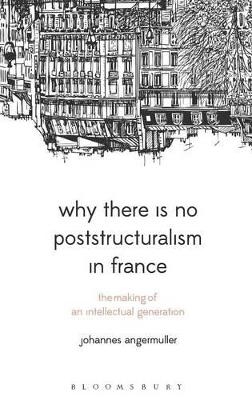
Why There Is No Poststructuralism in France
Bloomsbury Academic (Verlag)
978-1-4742-2630-1 (ISBN)
Outlining the institutional contexts, affinities, and rivalries of, among others, Althusser, Barthes, Foucault, Irigaray, and Kristeva, Angermuller – drawing from Bourdieu’s concepts of cultural capital and the academic field – insightfully explores post-structuralism as a phenomenon. By tracing the evolution of the French intellectual field after the war, Why There is No Poststructuralism in France places French Theory both in the specific material conditions of its production and the social and historical contexts of its reception, accounting for a particularly creative moment in French intellectual life which continues to inform the theoretical imaginary of our time.
Johannes Angermuller is Professor of Discourse and directs the DISCONEX research group at the university of Warwick, UK and at School for Advanced Studies in the Social Sciences (EHESS) in Paris, France.
Preface
1 Introduction: the intellectual field in France
1.1 ‘Poststructuralism’—an international misunderstanding?
1.2 Structuralism and post-structuralism in intellectual sociology of intellectuals
2 Structuralism versus post-structuralism. The birth of an intellectual generation
2.1 The transformations of Theory. From structuralism to ‘poststructuralism’
2.2 Why there is no poststructuralism in France. Foucault, Derrida & Co. in the French intellectual field
2.2.1 Theoretical lines of conflict. Structuralists and ex-, non- and anti-structuralists
2.2.2 The arena of political conflict: the Communist Party and ‘68
2.2.3 Schools, clans, networks
2.2.4 Disciplinary cleavages between the human sciences and philosophy
2.2.5 Alternative education routes: elite academics versus colorful résumés
2.2.6 Peripheral institutions against the academic center
3 Rise and decline of the structuralist generation
3.1 From modernity to postmodernity: the intellectual field since the Enlightenment
3.2 The boom of the human sciences in the 1960s and 1970s
3.3 The formation of the structuralist generation
3.4 The neoliberal turn of the 1980s
4 From Theory in France to French Theory: the making of ‘poststructuralism’ in the post-national university
5 The Moment of Theory: the Social After Society
Notes
References
Index
| Erscheint lt. Verlag | 8.10.2015 |
|---|---|
| Reihe/Serie | Bloomsbury Studies in Continental Philosophy |
| Verlagsort | London |
| Sprache | englisch |
| Maße | 156 x 234 mm |
| Gewicht | 381 g |
| Themenwelt | Geisteswissenschaften ► Philosophie ► Geschichte der Philosophie |
| Geisteswissenschaften ► Philosophie ► Philosophie der Neuzeit | |
| Geisteswissenschaften ► Sprach- / Literaturwissenschaft ► Sprachwissenschaft | |
| Sozialwissenschaften ► Soziologie ► Allgemeines / Lexika | |
| ISBN-10 | 1-4742-2630-2 / 1474226302 |
| ISBN-13 | 978-1-4742-2630-1 / 9781474226301 |
| Zustand | Neuware |
| Informationen gemäß Produktsicherheitsverordnung (GPSR) | |
| Haben Sie eine Frage zum Produkt? |
aus dem Bereich


